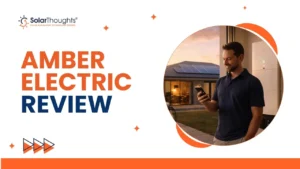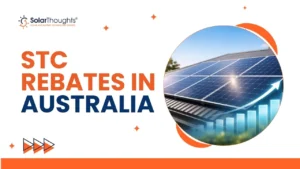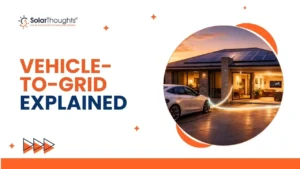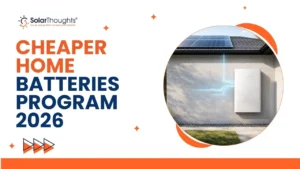If you’re thinking about putting up solar panels, the terms “single glass” and “double glass” probably have appeared in your research. It’s important to know the distinctions between these two types of panels because it help you make a knowledgeable choice for your solar energy system. This detailed guide will examine the features, benefits, and possible disadvantages of single-glass and double-glass solar panels.
Table of Contents
ToggleWhat is a Single Glass Solar Panel?
Single glass solar panels, also known as myofascial panels, are the traditional and most common type of solar panels used in residential and commercial installations. These panels consist of a layer of solar cells sandwiched between a glass front sheet and a polymer back sheet.
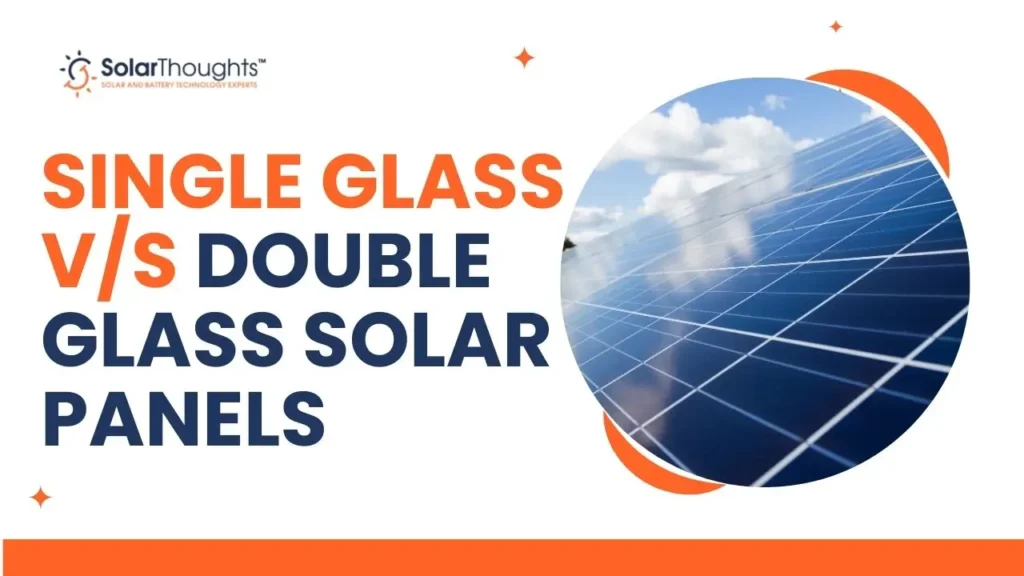
Key Features of Single Glass Solar Panels:
1) Structure: A typical single glass panel has a front layer of tempered glass, followed by an encapsulant material (usually EVA – Ethylene Vinyl Acetate), then the solar cells, another layer of the encapsulant, and finally a back sheet made of a polymer material.
2) Weight: Single glass panels are generally lighter than their double glass counterparts, making them easier to install and handle.
3) Efficiency: These panels are highly efficient in converting sunlight into electricity, with modern panels reaching efficiency rates of 15-22% depending on the technology used.
4) Cost: Single glass panels are usually less expensive than double glass panels, making them a more budget-friendly option for many installations.
5) Durability: While durable, single glass panels may be more susceptible to environmental factors like humidity and potential-induced degradation (PID) compared to double glass panels.
Flexibility: The polymer back sheet allows for some flexibility, which can be beneficial during installation and in certain environmental conditions.
What is a Double Glass Solar Panel?
Double glass solar panels, also referred to as glass-glass or bifacial panels, are a newer technology in the solar industry. As the name suggests, these panels have glass on both the front and back sides, encapsulating the solar cells between two layers of glass.
Key Features of Double Glass Solar Panels:
1) Structure: Double glass panels consist of a front glass layer, an encapsulant layer, solar cells, another encapsulant layer, and a back glass layer. This creates a symmetrical sandwich structure with glass on both sides.
2) Weight: Due to the additional glass layer, these panels are typically heavier than single glass panels, which may require more robust mounting systems.
3) Bifacial Capability: Many double glass panels are bifacial, meaning they can capture sunlight from both sides, potentially increasing energy production by 5-30% depending on installation conditions.
4) Durability: The glass-glass construction provides superior protection against environmental factors, resulting in less degradation over time and potentially longer lifespans.
5) Transparency: Some double glass panels offer varying degrees of transparency, which can be aesthetically pleasing and functional in certain applications like solar carports or greenhouses.
6) PID Resistance: Double glass panels generally have better resistance to potential-induced degradation (PID), a phenomenon that can reduce panel efficiency over time.
Comparing Single Glass and Double Glass Solar Panels
Now that we’ve covered the basics of both panel types, let’s dive into a more detailed comparison to help you understand which might be the better choice for your solar installation.
1. Durability and Lifespan
Double glass panels have a clear advantage when it comes to durability. The glass-glass construction provides better protection against environmental factors such as humidity, salt mist, and sand. This increased durability often translates to a longer lifespan, with some manufacturers offering warranties of up to 30 years for double-glass panels compared to the standard 25 years for single-glass panels.
2. Efficiency and Energy Production
While both panel types can offer high efficiency, double glass panels with bifacial capabilities have the potential to produce more energy in certain conditions. If installed in a way that allows light to reach the back of the panels (such as on flat roofs or ground-mounted systems), bifacial double glass panels can generate additional electricity, increasing overall system yield.
3. Weight and Installation Considerations
Single glass panels have the advantage of being lighter, which can be crucial for rooftop installations where weight is a concern. The lighter weight also makes them easier to handle during installation, potentially reducing labor costs. Double glass panels, being heavier, may require additional structural support and more careful handling during installation.
4. Cost Considerations
Initially, single glass panels tend to be less expensive than double glass panels. However, when considering the long-term value, the increased durability and potential for higher energy production of double glass panels could offset the higher upfront cost over the system’s lifetime.
5. Aesthetic Appeal
Double glass panels, especially those with some degree of transparency, can offer unique aesthetic possibilities. They can be integrated into building designs as semi-transparent elements, making them popular for solar carports, pergolas, or architectural features. Single glass panels, while less versatile in this regard, offer a sleek, traditional solar panel appearance that many homeowners prefer.
6. Performance in Extreme Conditions
Double glass panels generally perform better in extreme conditions. They have better resistance to severe weather events, such as hailstorms, and are less prone to microcracks that can develop in single glass panels over time due to thermal stress.
7. Potential-Induced Degradation (PID) Resistance
Double glass panels typically offer superior resistance to PID, a phenomenon that can significantly reduce panel efficiency over time. This resistance is due to the glass-glass construction, which provides better insulation for the solar cells.
Making the Right Choice for Your Solar Installation
Choosing between single-glass and double-glass solar panels depends on various factors specific to your situation:
1) Installation Location: If you’re installing on a weight-sensitive roof, single glass panels might be preferable. For ground-mounted systems or sturdy flat roofs where bifacial gains can be maximized, double glass panels could be advantageous.
2) Climate: In areas with extreme weather conditions or high humidity, the added durability of double glass panels could be beneficial.
3) Budget: If upfront costs are a primary concern, single glass panels might be more suitable. However, if you’re focused on long-term value and performance, the additional cost of double glass panels could be justified.
4) Aesthetic Requirements: Consider the visual impact of the panels on your property. If you’re looking for unique design possibilities, double glass panels offer more options.
5) Energy Production Goals: If maximizing energy production is a priority and your installation setup can benefit from bifacial technology, double glass panels could be the better choice.
Conclusion
In conclusion, both single-glass and double-glass solar panels have their unique advantages. Single glass panels offer a tried-and-true solution with lower upfront costs and easier installation, while double glass panels provide enhanced durability, potential for higher energy production, and unique aesthetic possibilities. By carefully considering your specific needs and circumstances, you can make an informed decision that will provide you with clean, efficient solar energy for decades to come.
Remember, consulting with a professional solar installer can provide valuable insights tailored to your specific situation, helping you make the best choice for your solar energy system. If you are thinking of installing solar panels, contact Solar Thoughts™ today or Find us Map Solar Panel Installation Brisbane!
Read More On
How Much Do Solar Panels Cost in Brisbane?
6.6kW Solar Panel Systems in Brisbane
Our Popular Services
New Solar Panel Installation | Upgrade Solar Panel System | Battery Storage Installation | Ev Charger Installation | Inverter Installation in Brisbane

